

Crowns are an ideal way to rebuild teeth which have been broken, or have been weakened by decay or a very large filling. The crown fits right over the remaining part of the tooth, making it strong and giving it the shape and contour of a natural tooth. Crowns are sometimes also known as 'caps'. An 'Anterior Crown' is a crown fitted to the front eight teeth.
There are a number of reasons. For instance:
Crowns are made of a variety of materials and new materials are being introduced all the time. Here are some of the options available at present:
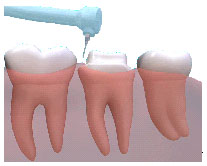 The dentist will prepare the tooth to the ideal shape for the crown. This will mean removing most of the outer surface, and leaving a strong inner 'core'. The amount of the tooth removed will be the same as the thickness of the crown to be fitted. Once the tooth is shaped, the dentist will take an impression of the prepared tooth, one of the opposite jaw and possibly another to mark the way you bite together. The impressions will be given to the technician, along with any other information they need to make the crown.
The dentist will prepare the tooth to the ideal shape for the crown. This will mean removing most of the outer surface, and leaving a strong inner 'core'. The amount of the tooth removed will be the same as the thickness of the crown to be fitted. Once the tooth is shaped, the dentist will take an impression of the prepared tooth, one of the opposite jaw and possibly another to mark the way you bite together. The impressions will be given to the technician, along with any other information they need to make the crown.
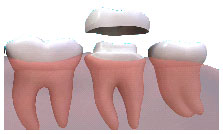 The impressions and information about the shade of your teeth will be given to a dental technician who will be skilled in making crowns. They will make models of your mouth and make the crown on these to be sure that the crown fits perfectly.
The impressions and information about the shade of your teeth will be given to a dental technician who will be skilled in making crowns. They will make models of your mouth and make the crown on these to be sure that the crown fits perfectly.
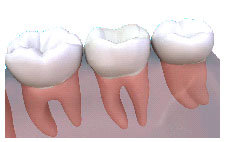 No. The crown will be made to match your other teeth exactly. The shade of the neighbouring teeth will be recorded, to make sure that the colour looksnatural and matches the surrounding teeth. A temporary crown, usually made in plastic, will be fitted at the end of the first appointment to last until the permanent one is ready. These temporary crowns may be more noticeable, but they are only in place for about two weeks.
No. The crown will be made to match your other teeth exactly. The shade of the neighbouring teeth will be recorded, to make sure that the colour looksnatural and matches the surrounding teeth. A temporary crown, usually made in plastic, will be fitted at the end of the first appointment to last until the permanent one is ready. These temporary crowns may be more noticeable, but they are only in place for about two weeks.
You will need to have at least two visits: the first for the preparation, impression, shade taking and fitting the temporary crown, and the second to fit the permanent crown.
No. A local anaesthetic is used and the preparation should feel no different from a filling. If the tooth does not have a nerve, and a post crown is being prepared, then local anaesthetic may not be needed.
Post crowns may be used when the tooth has been root filled. The weakened crown of the tooth is drilled off at the level of the gum. The dentist makes a double-ended 'post' to fit into the root canal. This can be either prefabricated stainless steel or custom made of gold. One end of the post is cemented into the root canal, and the other end holds the crown firmly in place.
If a root-filled tooth is not completely broken down, it may be possible to build it up again using filling material.
Your appearance is one reason. Another is that the gap left by a missing tooth can mean greater strain on the teeth at either side. A gap can also mean your 'bite' is affected, because the teeth next to the space can lean into the gap and alter the way the upper and lower teeth bite together. This can then lead to food getting packed into the gap, which causes both decay and gum disease. How are missing teeth replaced?
This depends on the number of teeth missing and on where they are in the mouth. The condition of the other teeth also affects the decision. There are two main two ways to replace the missing teeth. The first is with a removable false tooth or teeth - a partial denture. The second is with a fixed bridge. A bridge is usually used where there are fewer teeth to replace, or when the missing teeth are only on one side of the mouth.
Yes, if you have enough strong teeth with good bone support. We will help you decide the best way of replacing your missing teeth within your budget.
Bridges are usually made of a precious metal base. If the bridge will show, porcelain is then bonded to the base. Sometimes, there are other non-precious metals used in the base to reduce the cost.
Although a bridge may seem expensive it will last many years. It will also improve your appearance and bite. A bridge uses the considerable skill of the dentist and technician, and in this way, it's similar to ordering a piece of hand-made jewellery. The materials are also expensive so it's fair to say a bridge will not be the cheapest treatment you have ever had.
You need to clean your bridge every day, to prevent problems such as bad breath and gum disease. You also have to clean under the false tooth every day. Your dentist or hygienist will show you how to use a bridge needle or special floss, as a normal toothbrush cannot reach.
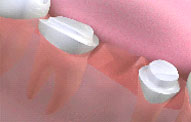
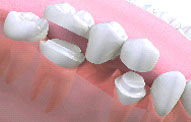
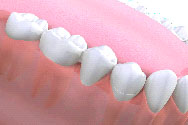 There are other methods, such as using a combination of crowns and partial dentures that can keep the retaining clips out of sight. These are quite specialised dentures, so you should ask your dentist about them. You can also have teeth implanted, ask your dentist for more information. Remember that it's as important to care for your remaining teeth as it is to replace the missing ones.
There are other methods, such as using a combination of crowns and partial dentures that can keep the retaining clips out of sight. These are quite specialised dentures, so you should ask your dentist about them. You can also have teeth implanted, ask your dentist for more information. Remember that it's as important to care for your remaining teeth as it is to replace the missing ones.
Yes, there are different types of bridge which use different fixing methods. We will choose the most effective and conservative bridge for your personal situation.
Metal Ceramic Crown And Bridge
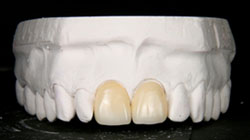
Cercon Longspan Full Mouth Crown And Bridge
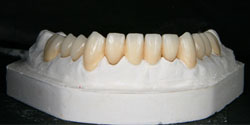
Metal Ceramic Crown
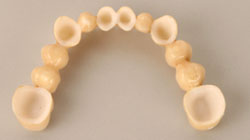
A veneer is a thin layer of porcelain made to fit over the front surface of a tooth, like a false fingernail fits over a nail. Sometimes a natural colour 'composite' material is used instead of porcelain.
Veneers make teeth look natural and healthy, and because they are very thin and are held in place by a special strong bond (rather like super-glue) very little preparation of the tooth is needed.
Veneers can improve the colour, shape and position of teeth. A precise shade of porcelain can be chosen to give the right colour to improve a single discoloured or stained tooth or to lighten front teeth (usually the upper ones) generally. A veneer can make a chipped tooth look intact again. The porcelain covers the whole of the front of the tooth with a thicker section replacing the broken part. Veneers can also be used to close small gaps, when orthodontics (braces) are not suitable. If one tooth is slightly out of position, a veneer can sometimes be fitted to bring it into line with the others.
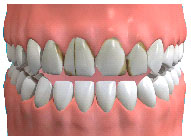 A natural-coloured filling material can be used for minor repairs to front teeth. This is excellent where the tooth supports the filling, but may not work so well for broken tooth corners. There will always be a join between the tooth and the filling material.
A natural-coloured filling material can be used for minor repairs to front teeth. This is excellent where the tooth supports the filling, but may not work so well for broken tooth corners. There will always be a join between the tooth and the filling material.
Crowns are used for teeth that need to be strengthened - either because they have broken, have been weakened by a very large filling, or have had root canal treatment.
Veneers should last for many years, but they can chip or break, just as your own teeth can. Your dentist will tell you how long each individual veneer should last. Small chips can be repaired, or a new veneer fitted if necessary.
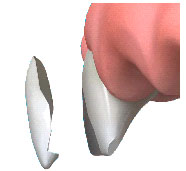 Some of the shiny outer enamel surface of the tooth may be removed, to make sure that the veneer can be bonded permanently in place later. The amount of enamel removed is tiny and will be the same as the thickness of the veneer to be fitted, so that the tooth stays the same size. A local anaesthetic (injection) may be used to make sure that there is no discomfort, but often this is not necessary. Once the tooth has been prepared, the dentist will take an 'impression'. This will be given to the dental technician, along with any other information needed to make the veneer. The colour of the surrounding teeth is matched on a shade guide to make sure that the veneer will look entirely natural.
Some of the shiny outer enamel surface of the tooth may be removed, to make sure that the veneer can be bonded permanently in place later. The amount of enamel removed is tiny and will be the same as the thickness of the veneer to be fitted, so that the tooth stays the same size. A local anaesthetic (injection) may be used to make sure that there is no discomfort, but often this is not necessary. Once the tooth has been prepared, the dentist will take an 'impression'. This will be given to the dental technician, along with any other information needed to make the veneer. The colour of the surrounding teeth is matched on a shade guide to make sure that the veneer will look entirely natural.
 A veneer takes at least two visits; the first to prepare the tooth and to match the shade, and the second to fit it. Before bonding it in place, your dentist will show you the veneer on your tooth to make sure you are happy with it. Bonding a veneer in place is done with a special adhesive, which holds it firmly on the tooth. Here at Advance Dental Clinic we also offer veneers which can be fabricated and fitted within a single visit.
A veneer takes at least two visits; the first to prepare the tooth and to match the shade, and the second to fit it. Before bonding it in place, your dentist will show you the veneer on your tooth to make sure you are happy with it. Bonding a veneer in place is done with a special adhesive, which holds it firmly on the tooth. Here at Advance Dental Clinic we also offer veneers which can be fabricated and fitted within a single visit.
Only minor adjustments can be made to the veneer after it is fitted. It is usually best to wait a little while to get used to it before any changes are made. Your dentist will probably want to check and polish it a week or so after it is fitted, and to make sure that you are happy with it.
| Monday-Saturday | 3pm - 7pm |
| Sunday | Holiday |
For Appointments
Contact +91 9447219903
Online, Telephone, & Email booking available
Copyright ©2024 • Designed by Akeydesigns